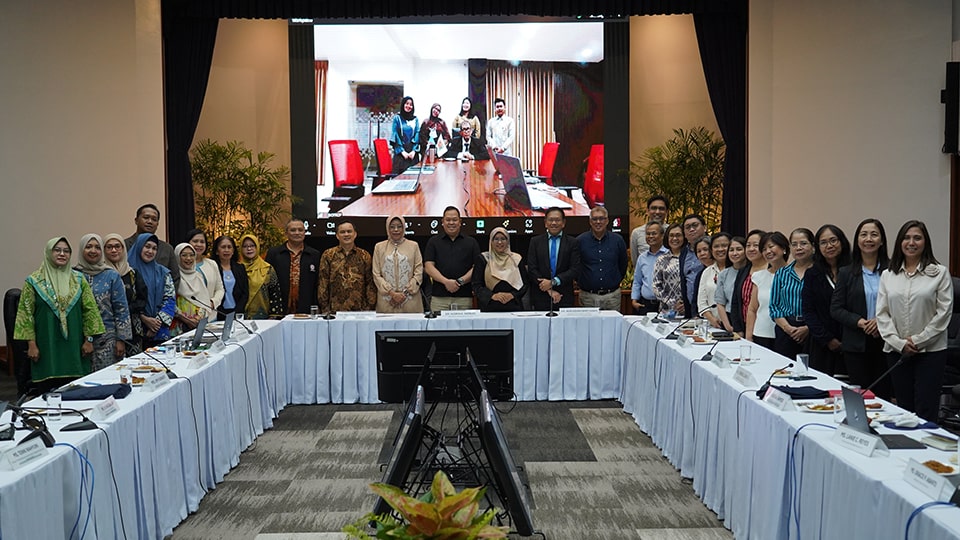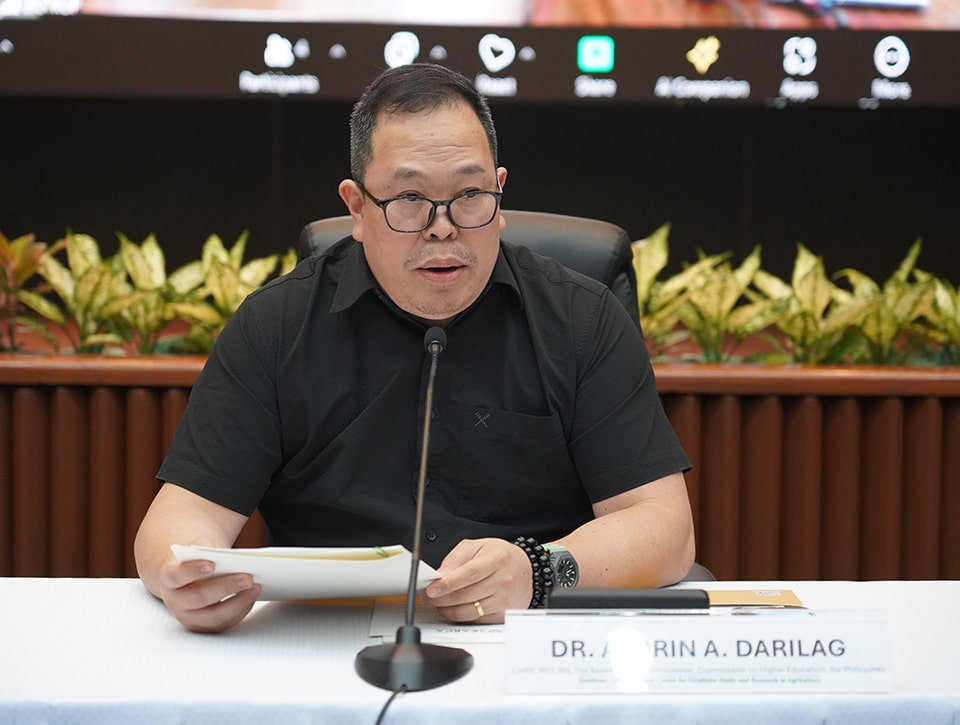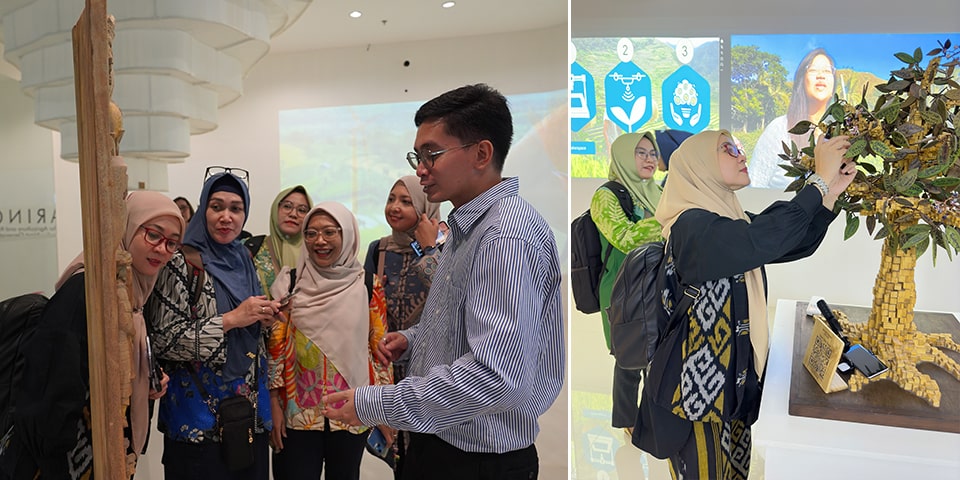 Indonesian Ministry of Education, Culture, Research, and Technology (MoECRT) and Indonesia-hosted Southeast Asian Ministers of Education Organization (SEAMEO) centers: the Southeast Asian Regional Centre for Tropical Biology (BIOTROP) and the SEAMEO Regional Open Learning Center (SEAMOLEC), visit the Southeast Asian Regional Center for Graduate Study and Research in Agriculture (SEARCA) to benchmark the Center's institutional and financial management best practices and broach potential collaborative programs.
Indonesian Ministry of Education, Culture, Research, and Technology (MoECRT) and Indonesia-hosted Southeast Asian Ministers of Education Organization (SEAMEO) centers: the Southeast Asian Regional Centre for Tropical Biology (BIOTROP) and the SEAMEO Regional Open Learning Center (SEAMOLEC), visit the Southeast Asian Regional Center for Graduate Study and Research in Agriculture (SEARCA) to benchmark the Center's institutional and financial management best practices and broach potential collaborative programs.
Delegates from the Indonesian Ministry of Education, Culture, Research, and Technology (MoECRT) and Indonesia-hosted Southeast Asian Ministers of Education Organization (SEAMEO) centers—the Southeast Asian Regional Centre for Tropical Biology (BIOTROP) and the SEAMEO Regional Open Learning Center (SEAMOLEC) visited the Southeast Asian Regional Center for Graduate Study and Research in Agriculture (SEARCA) on 22 July 2024 to benchmark the Center's institutional and financial management best practices and broach potential collaborative programs.
The visitors were led by Prof. Dra. Tjitjik Sri Tjahjandarie, Secretary to the Directorate General of Higher Education, Research, and Technology (DGHERT), MoECRT and Country Representative of Indonesia to the SEARCA Governing Board; Dr. Aldrin Darilag, Commissioner of the Philippine Commission on Higher Education (CHED) and Chair of the BIOTROP Governing Board; and Dr. Yaya Sutaryo, Deputy Director for Administration of SEAMOLEC. BIOTROP Director Dr. Zulhamsyah Imran joined the meeting remotely.
SEARCA, BIOTROP, and SEAMOLEC are among the 26 SEAMEO regional centers and one network in 11 Southeast Asian countries. BIOTROP focuses on sustainable biodiversity management in Southeast Asia, providing trainings and educational programs in tropical biology and biotechnology that support regional and economic development. On the other hand, SEAMOLEC specializes in open and distance learning in the region. MoECRT hosts both BIOTROP and SEAMOLEC.
 Dr. Aldrin Darilag, Commissioner of the Philippine Commission on Higher Education (CHED) and Chair of the BIOTROP Governing Board, leads the BIOTROP delegation.
Dr. Aldrin Darilag, Commissioner of the Philippine Commission on Higher Education (CHED) and Chair of the BIOTROP Governing Board, leads the BIOTROP delegation.
Dr. Darilag highlighted the significance of the meeting among the three SEAMEO Centers, the MoECRT, and the Philippine Commission on Higher Education.
"This collaboration aims to improve communication, management, and fund development among the SEAMEO centers and the higher education institutions," he shared.
The benchmarking activity comprised presentations by the Indonesia-hosted SEAMEO centers on their accomplishments, flagship programs, and institutional and financial management processes. On SEARCA's side, Assoc. Prof. Joselito Florendo, Deputy Director for Administration, provided an overview of the Center's programs, offerings, and financial management practices. Prof. Dra. Tjitjik noted that some of SEARCA's financial management best practices might not apply to SEAMEO Centers in Indonesia due to government regulations.
Ms. Sharon Malaiba, Head of the Partnerships Unit, explained the Center's collaborative engagement with various academic and research organizations, industry, and government and development entities within and beyond the region.
BIOTROP was keen to explore potential collaborations, specifically on the promotion of their publications, namely the SCOPUS-indexed Southeast Asian Journal of Tropical Biology (BIOTROPIA), the BIODivers magazine, the BIO Courier newsletter, and BIOSphere special publications. They invited SEARCA experts to contribute articles to any of the abovementioned publications or serve as reviewers and potential editorial board members for BIOTROPIA and Biodivers. SEARCA reciprocated by inviting BIOTROP experts to submit articles to the Asian Journal for Agriculture and Development (AJAD) and other SEARCA-managed publications and discussed potential co-publication projects.
Noting SEARCA's priority areas, Prof. Dra. Tijtjik also proposed partnerships on internships and mobility programs for Indonesian students and faculty. Assoc. Prof. Florendo suggested reinvigorating the staff exchange program among SEAMEO centers, a proposal supported by Ms. Tenni Wahyuni, BIOTROP Human Resources Manager, who planned to discuss this further with SEARCA's Human Resources Management Unit.
 The visitors tour the SEARCA Hub for Agriculture and Rural Innovation for the Next Generation (SHARING) AgriMuseum.
The visitors tour the SEARCA Hub for Agriculture and Rural Innovation for the Next Generation (SHARING) AgriMuseum.
The visitors were given a tour of the SEARCA Hub for Agriculture and Rural Innovation for the Next Generation (SHARING) AgriMuseum to cap the meeting. This was followed by a rolling tour of the International Rice Research Institute (IRRI) and the University of the Philippines Los Baños (UPLB) campus.